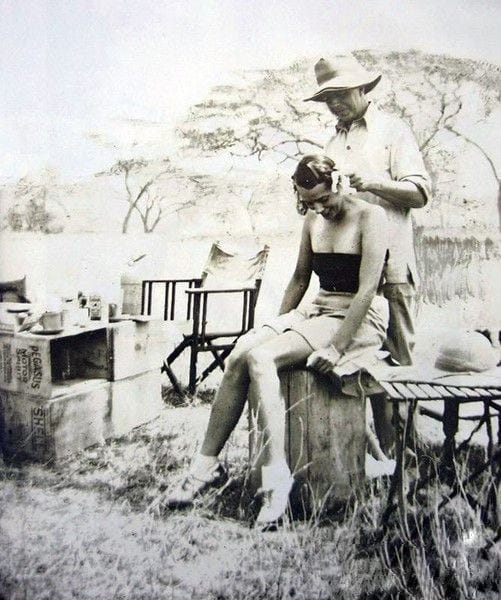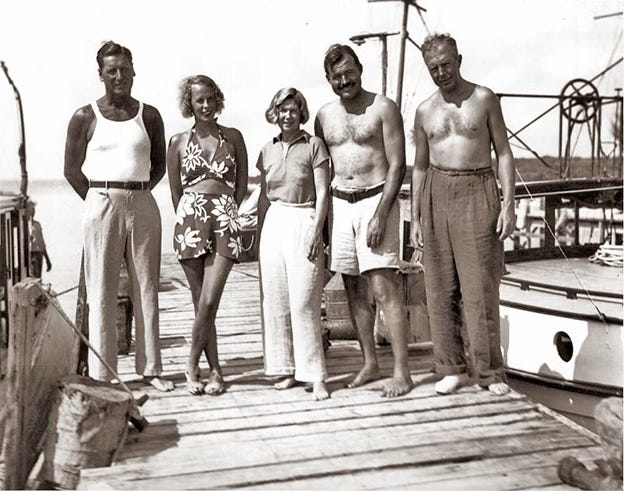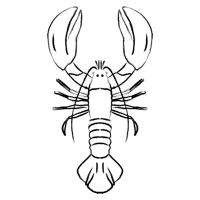“The Baron was not a man that you forget.”
— Ernest Hemingway

Born to an aristocratic Swedish family, Baron Bror von Blixen-Finecke married his Danish second-cousin Karen Blixen (better known by her pen name Isak Dinesen) in 1914. The couple moved to Kenya, where they bought a coffee plantation. After divorcing his first wife, he became a legendary guide in safari expeditions throughout Africa.
Table of Contents: Early Life / Karen’s Interest in Hans and Bror / Marriage and Move to Africa / Relationship between Bror and Karen / Life After Karen / Safari Guide / Literary Contributions / Later years / Did you know?
If you aren’t subscribed yet, hit the subscribe button below to receive the Adorable Stories every weekend, directly in your inbox:
The Adventurous Life of Bror Blixen
Early Life
Bror Fredrik von Blixen-Finecke was born on July 25, 1886, into Swedish nobility. He and his identical twin brother, Hans Gustaf von Blixen-Finecke, grew up in a privileged environment. Hans went on to become an Olympic equestrian, winning gold in the 1912 Summer Olympics, while Bror’s path led him to a life of adventure, particularly in Africa.
Bror’s parents, Baron Carl Frederik von Blixen-Finecke (1847–1919) and Countess Clara Krag-Juel-Vind-Frijs (1855–1925), hailed from distinguished Scandinavian lineages.
Bror’s family was not particularly wealthy though. They had social standing but faced financial challenges.
Bror’s maternal uncle, Count Mogens Frijs, and his tales of life in Naivasha, inspired young Bror to seek his future in Africa
Karen’s Interest in Hans and Bror
Karen Dinesen, later known to the wider public with her pen name of Isak Dinesen, came from a wealthy and prominent Danish family.
Her family owned a successful estate, Rungstedlund, which provided her with ample financial stability.
Additionally, her father, Wilhelm Dinesen, was a well-known author and military man, contributing to the family’s social standing and wealth.
Karen was initially interested in Bror’s identical twin brother, Hans Gustaf von Blixen-Finecke. Hans had a charismatic presence that attracted Karen but he did not reciprocate Karen’s romantic interest.
Marriage and Move to Africa
Once Hans rejected Karen, it was Bror who eventually pursued her. Bror’s charm and adventurous nature eventually won Karen over, leading to their decision to move to Africa in 1913 and their subsequent marriage in 1914.
The relationship between Karen and Bror was complex, characterized by a mix of love, adventure, and challenges. Despite the difficulties they faced, their time together in Africa left a significant impact on both of their lives.
Bror and Karen decided to relocate to British East Africa (now Kenya) in order to start and manage a coffee plantation with the financial support of Karen’s family.
The plantation was situated at the foot of the Ngong Hills near Nairobi.
Despite challenges such as poor soil quality, a steep learning curve regarding how to grow coffee at high altitude, and financial difficulties, the couple’s time in Africa was transformative for both of them.
Bror’s passion for hunting flourished, and Karen found inspiration for her writing, which would later culminate in her famous memoir, Out of Africa.
Relationship between Bror and Karen
Bror and Karen’s relationship was marked by both passion and turbulence.
They shared a deep love for Africa and a sense of adventure, but their marriage faced significant challenges.
Bror’s love for hunting and his adventurous lifestyle often kept him away from the plantation, leaving Karen to handle many of the day-to-day operations alone.
Bror also served in World War I while in Africa with Lord Delamere’s patrols along the border with German-Tanganyikain in the East African Campaign, which took place from 1914 to 1918. He left Karen alone managing the plantation for most part of those four years.
Soon after relocating to Africa, Bror started womanising: during their time together, Bror and Karen contracted syphilis (albeit it is not sure who infected whom, since recent sources claim that Karen was probably infected first, during her years in Paris), which they struggled to treat in the early 20th century.
The disease had a profound impact on their health and their relationship. Despite these hardships, they maintained a bond of mutual respect and affection.
Karen often wrote about Bror in her letters and memoirs, acknowledging his prominent role in her African adventure.
Bror’s infidelity naturally strained their marriage. He had numerous affairs, which Karen found difficult to forgive.
Their relationship became increasingly distant, and by 1921, they were living separately. Despite their personal issues, they continued to collaborate on the management of the plantation until its eventual failure in 1923, due to financial difficulties and a devastating fire.
Karen, too, found solace outside their marriage. She fell deeply in love with the English big-game hunter Denys Finch Hatton (albeit it is not know if their relationship remained on a platonic level only).
Their relationship became one of the most significant aspects of her life in Africa. Denys (who also had relationships with other women at the time, including with legendary Kenyan aviator and author Beryl Markham) was a frequent visitor to Karen’s home, and their bond grew stronger over time, providing her with emotional support and inspiration for her writing.
The divorce between Bror and Karen in 1925 marked the end of their marital relationship, but not their connection. Karen remained in Africa for some time, continuing to write and draw inspiration from her experiences.
Tragically, Denys Finch Hatton died in a plane crash in 1931, a loss that profoundly affected Karen.
Bror, on the other hand, fully embraced the life of a safari guide and hunter. Despite the end of their marriage, they both spoke of each other with a sense of nostalgia and respect in their later years.
Life After Karen
After his divorce from Karen, Bror Blixen married the British aristocrat Jacqueline Harriett “Cockie” Hoogterp in 1928.
Bror and Cockie remained in Africa and managed Singu, a 5,000 acres property at Babati, owned by Blixen’s first hunting client Dick Cooper. In 1929, Blixen concentrated on his safari business and became Cooper’s East Africa agent.
The safari work proved quite profitable and enabled the Blixens to purchase their own farm at Ndasagu.
When he was visited in Kenya by the Swedish adventurer and aviator Eva Dickson in 1932 — while Cockie was visiting her mother in England — he and Eva became lovers and Cockie decided to break up with him.
“I have never regretted anything — except leaving Blix. He was the love of my life.”
— Cockie Hoogterp
In 1935, Bror and Cockie divorced, and the following year he married Eva in New York: they spent their honeymoon together with Ernest Hemingway and his wife Pauline Pfeiffer sailing around Cuba and the Bahamas.

Eva Dickson, a Swedish explorer and rally driver and the first woman to have ever crossed the Sahara by automobile, was a remarkable woman in her own right, totally sharing Bror’s zest for adventure.
Unfortunately, their time together was cut short when Eva died in a car crash outside Baghdad in March 1938, on her way back from Calcutta after having been forced to give up her big dream of driving the Silk Road to Beijing.
Bror didn’t learn about her death until July 28th, 1938, and he was devastated by the news.
Safari Guide
“Hunting with Blix was a magnificent experience”
— One of Bror’s clients
After divorcing Karen and leaving behind the failure of the coffee plantation, Bror stayed in Africa and became a celebrated big-game hunter and safari guide.
His clients included European royalty and American celebrities such as the Prince of Wales (later King Edward VIII) and the writer Ernest Hemingway.
Known for his expertise, charisma, and bravery, Bror led many thrilling and dangerous hunts across the African wilderness. His adventures and lifestyle contributed significantly to the romanticized image of Africa during that era.

In his book, “The Man Whom Women Loved” published in 1987, Ulf Aschan renders Bror as a celebrated character in East Africa: coffee planter, white hunter, trailblazer, explorer, and philanderer: “a merry cheerful man who was always in a good mood.”
Bror also had nerves of steel:
“he doesn’t shoot a charging elephant at ten feet, because he knows it’s a mock charge.”
Beryl Markham was also quoted saying:
“Bror was the toughest, most durable white hunter ever to snicker at the fanfare of safari or to shoot a charging buffalo between the eyes while debating whether his sundown drink would be gin or whiskey... The mould has been broken.”
Literary Contributions
Bror Blixen was not only an adventurer but also an author.
He penned his memoir, African Hunter, which was published in 1937. The book offers a vivid account of his life and expeditions in Africa, reflecting his deep admiration for the continent’s landscapes and wildlife.
To this day, African Hunter remains a classic in hunting literature, capturing the spirit of early 20th-century safari life.
Later Years
When the second world war broke out, Bror Blixen wanted to go back to Europe to do his part in the war. He managed to raise enough money in the United States to buy a field hospital, which he brought across to Namsos in Norway. Here the war raged between the Germans and the Norwegians.
The Germans, however, had the upper hand, and Bror and the hospital staff were forced to flee from the Germans across the border to Sweden.
Bror spent the remaining years of his life, from 1940 to 1946, in a small cottage on the Näsbyholm estate.
Bror Blixen’s adventurous life came to an abrupt end on March 4th, 1946 in a car accident where he was a passenger, near his estate in Sweden. The accident was severe, and he succumbed to his injuries shortly after. He was 59 years old.
—Alberto @
Do you know anyone who would love to read this Adorable Story? Show your support by sharing Adorable Times’ Newsletter and earn rewards for your referrals.
Did you know?
Karen Blixen, thirty years after her first safari with Bror, was quoted saying:
“If I should wish anything back of my life, it would be to go on safari once again with Bror Blixen.”







